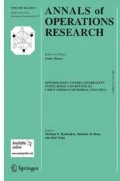Abstract
In this paper, we address some issues on the interface of buffer design and cyclic scheduling decisions in a multi-product deterministic flow line. We demonstrate the importance of the above interface for the throughput performance of the flow line. In particular, we point out that the use of sequence-independent information, such as workload distribution and variability in processing times among stations, is not adequate to decide the optimal buffer configuration of the flow line. We formulate the buffer design problem for a fixed sequence of jobs as a general resource allocation problem, and suggest two effective heuristics for its solution. For the simultaneous buffer design and cyclic scheduling problem, we suggest an iterative scheme that builds on the effectiveness of the above heuristics. One of the side results of our extensive computational studies on this problem is that the general guidelines of buffer design in single-product flow lines with stochastic processing times are not directly transferable to the multiproduct deterministic flow line environment.
Similar content being viewed by others
References
K.R. Baker, A comparative study of flow shop algorithms, Oper. Res. 23(1975)62–73.
R. Conway, W. Maxwell, J.O. McClain and L.J. Thomas, The role of work-in-process inventory in serial production lines, Oper. Res. 36(1988)229–241.
F.S. Hillier and R.W. Boling, The effect of some design factors on the efficiency of production lines with variable operations times, J. Ind. Eng. 17(1966)483–492.
F.S. Hillier and R.W. Boling, Finite queues in series with exponential or Erlang service time, Oper. Res. 15(1967)286–303.
F.S. Hillier, R.W. Boling and K.C. So, Toward characterizing the optimal allocation of storage space in production line systems with variable operation times, Working Paper, Department of Operations Research, Stanford University (March 1990).
F.S. Hillier and K.C. So, The effect of coefficient of variation of operation times on the allocation of storage space in production line systems, IIE Trans. 23(1991)198–206.
K.L. Hitz, Scheduling of flexible flowshops, Technical Report, MIT, Cambridge, MA (1979).
G.C. Hunt, Sequential arrays of waiting lines, Oper. Res. 4(1957)674–683.
T. Ibaraki and N. Katoh,Resource Allocation Problems: Algorithmic Approaches (The MIT Press, Cambridge, MA, 1988).
S. Karabati and P. Kouvelis, Cyclic scheduling in flow lines: Modeling observations, effective heuristics and an optimal solution procedure, Working Paper, Management Department, University of Texas at Austin (1991).
T.-E. Lee and M.E. Fosner, Performance measures and schedules in periodic job shops, Working Paper 1990-012, Department of ISE, Ohio State University (1991).
H. Matsuo, Cyclic sequencing problems in the two-machine permutation flowshop: Complexity, worst-case and average-case analysis, Naval Res. Log. Quart. 37(1990)679–694.
S.T. McCormick, M.L. Pinedo, S. Shenker and B. Wolf, Sequencing in an assembly line with blocking to minimize cycle time, Oper. Res. 37(1989)925–935.
C.L. Monma and A.H.G. Rinnooy Kan, A concise survey of efficiently solvable special cases of the permutation flowshop problem, RAIRO 17(1983)105–119.
T. Park and H.J. Steudel, The need to consider job sequencing policy when determining buffer capacity for fmc flow lines, in:Proc. 3rd ORSA/TIMS Conf. on Flexible Manufacturing Systems (Elsevier, 1989).
N.P. Rao, Two stage production systems with intermediate storage, AIIE Trans. 7(1975)414–421.
B.R. Sarker, Some comparative and design aspects of series production systems, IIE Trans. 16(1984)229–239.
T.L. Smunt and W.C. Perkins, Stochastic unpaced line design: Review and further experimental results, J. Oper. Manag. 5(1985)351–373.
R.J. Wittrock, Scheduling algorithms for flexible flow lines, IBM J. Res. Rev. 29(1985)401–412.
H. Yamashina and K. Okamura, Analyzing in-process buffer for multiple transfer line systems, Int. J. Prod. Res. 21(1983)183–195.
G. Yamazaki and H. Sakasegawa, Properties of duality in tandem queueing systems, Ann. Inst. Sat. Math. 27(1975)201–212.
Author information
Authors and Affiliations
Rights and permissions
About this article
Cite this article
Karabati, S., Kouvelis, P. The interface of buffer design and cyclic scheduling decisions in deterministic flow lines. Ann Oper Res 50, 295–317 (1994). https://doi.org/10.1007/BF02085645
Issue Date:
DOI: https://doi.org/10.1007/BF02085645




